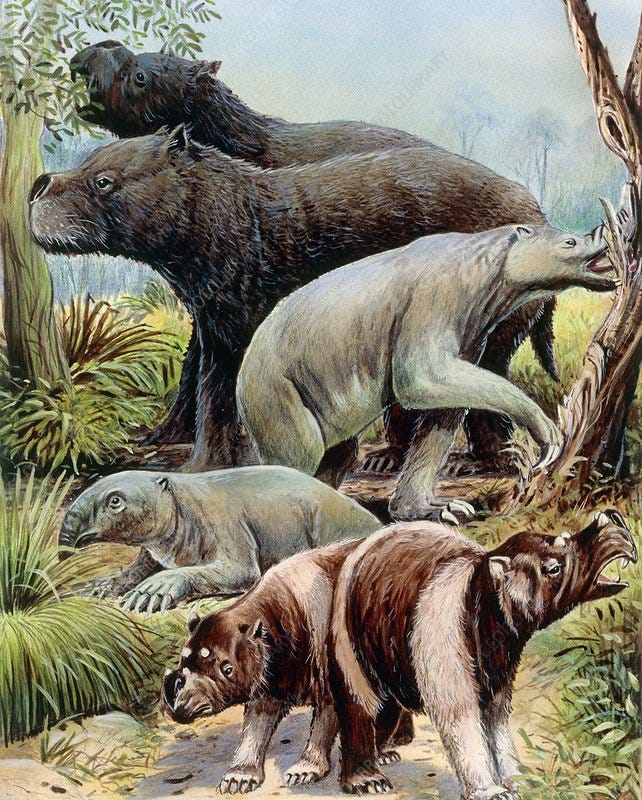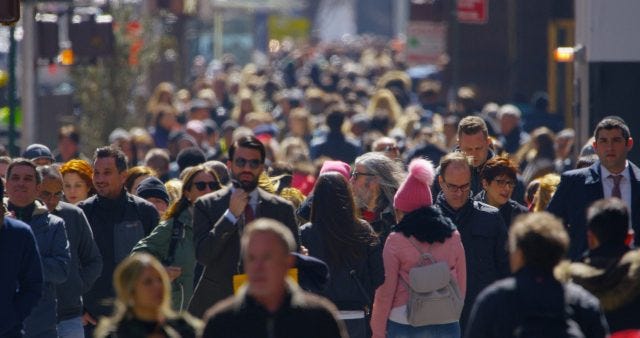What can we learn from our ancestors?
About 250,000 years ago, modern humans parted from our common ancestor marking the beginning of Homo Sapiens. We migrated from Africa and spread across the world starting around 70,000 years ago.
Over this time span, as hunter gathers, we evolved to think, interact, and live in a way that continues to define us.
Over the last 10,000 years, beginning with the agricultural revolution, we have moved away from our evolutionary roots. We have created an environment that is far more complex than what our genes had the time to adapt to.
As Darwin explains, we evolve to fit our environment. Evolution requires countless incremental iterations. Those species that have the ability to make more iterations in a smaller time scale have a greater chance of adapting to a changing environment.
Consider the theory of extinction of large animals throughout the globe. Prior to human migration to Australia, for example, there were large animals throughout Australia. Unlike Africa, these large animals did not evolve alongside humans. Thus, when humans arrived in Australia about 60,000 years ago, these large animals with longer life spans and fewer offspring, could not adapt to a new predator. Humans drove nearly all of these megafauna to extinction. As a rule of thumb, smaller animals with shorter life spans and more offspring can iterate and evolve faster. Compare the number of bug species with monkey species.

In the past 10,000 years, humans have created a rapidly changing environment that we are not fully evolutionarily equipped to comprehend.
We have essentially taken a person with the brain and body evolved to hunt and gather with a tribe of 150 people and thrown them in a city of 9 million people away from their family.
Our environment is completely different than what we’ve been evolutionary equipped to handle. My objective of this post is to demonstrate that it could help us to structure our lives, societies, and businesses to resemble our evolutionary upbringing as close as possible.
The most consequential way we have parted from our evolutionary upbringing is our departure from the familial structure. Our social structures are completely different than what we evolved to depend on.
Consider raising a child in New York City today. In the edge case, a couple is expected to raise this child on their own with only the help of (expensive) day care. Traditionally, we had an army of people helping to raise this child. As goes the African Proverb, “it takes a village to raise a child.” Sisters, brothers, grandparents, aunts and uncles, and friends took up some of the burden of raising this child. Today, a mom or dad is left alone in their apartment with a crying baby and expected to not go insane.

‘Sapiens’ by Yuval Noah Harari explains this change in society as markets and governments taking the place of a family and community. Markets have showed us that everything can be purchased. Daycare is an obvious example. Rather than rely on our sister to take care of the child, you can transact with someone to perform that specific task. Similarly, retirement homes have allowed us to disrupt familial ties and allow the market to provide the care we need for our parents. These changes have non-obvious implications. They increase loneliness and require people to search for community through other means (which is providing to be difficult!).
We can also consider other areas where we have strayed from our roots. The more you look, the more it becomes clear that we are inflicting our own suffering without knowing it.
We will never go back to the hunter-gatherer type of living, but it offers a lens for structuring our lives.
When thinking about when to sleep and for how long, we should look to our evolutionary design. In “Why We Sleep” by Matthew Walker, he explains some of our natural “settings”. These include sleeping for 8 hours and starting sleep at about the same time every day. In addition, Walker notes the theory that ancient humans would nap at peak heat in the day (around 1pm to 3pm). This historical sleeping time has carried until our 1pm meetings today that we cannot stay awake for. Walker notes that the areas of the world that have carried on this napping tradition (Spain, Greece, and others in Europe) have healthier and longer lives than the rest of the world. Correlation does not equal causation, but it does feels unnatural to force ourselves to stay awake when our bodies are telling us otherwise.
We can extend this same thought process to our diets. As Walter Willet explains in “Eat, Drink, and Be Healthy”, in general, we should avoid human processed food. Through extensive research over decades, Willet explains the importance of fresh vegetables, fruits, whole wheat grains, water, fats, and some meats. There are a million different theories about nutrition, but in short, Willet warns of high intake of processed meats, salt, sugar, refined grains (white bread), and dairy.
All of the foods Willet warns of are man made and made popular in the past 10,000 years or so. Ancient humans were not intaking 3 glasses of milk a day, and they definitely were not intaking 40 grams of sugar in a soda.
Nassim Taleb argues in favor of this diet in Antifragile with a simple heuristic - eat what your ancestors ate.
While health and fitness examples are interesting and useful, I believe even more insights can be extrapolated.
In “Blueprint” by Nicholas Chistakis, he attempts to understand some of the fundamental aspects of human society. Humans didn’t conquer the world through their brains or brawn, but rather their ability to organize in a society. Fundamental to this society is:
The capacity to have and recognize individual identity
Love for partners and offspring
Friendship
Social networks
Cooperation
Preference for one’s own group (that is, “in-group bias”)
Mild hierarchy
Social learning and teaching
Friendship, social networks, love for partners and offspring are essential to what it means to be human. It’s been this way for hundreds of thousands of years.
The picking apart of society in to market driven and exchangeable pieces has decreased our well-being in some ways as it can reduce some of these fundamental principles. (Note, this market driven shift has also improved our well-being in many ways as well). For example, imagine the hunter-gather group of hunters “working” with a group to hunt game. There were likely multiple generations, brothers, cousins, etc. that worked together for years. There was likely deep social networks and cooperation.
Contrast this to a gig economy worker, working alone, or an assembly line worker performing menial tasks alone day in and day out. They have have lost much of this social interaction we crave. Obviously there are examples of social networks and cooperation in the modern world, but it is likely not as strong.
Another interesting viewpoint on this is our use of technology. There are countless studies showing how Instagram impacts our brain. Evolutionarily, we were never designed to get that many “likes” at one point. Instagram capitalized on the dopamine rush from an Instagram like and made us addicted to this feeling. More simply put, the dopamine hits from this technology are far too overpowering than our evolutionary designed brains were built to handle.
Another example in support of this idea is that one of the best cures for depression is spending time in nature. Again, this links to our evolution. We’re not hardwired to live in a concrete jungle like New York or Beijing. There is a clear feeling when you spend time in nature that you’re connecting with something fundamentally human.

Now, where do we go from this? This is all very heavy and quite depressing.
First, I believe recognizing that this may be at least partly true could help us to diagnose mental health issues and societal issues. When we structure our society and personal lives, we can think to ourselves, “Am I doing fighting against millions of years of natural selection?”. If so, it likely is not good for you.
The causes of this 10,000 year shift from our hunter-gatherer roots to a global society has millions of different influences and causes. They range from random happenstance, world changing discoveries, fossil fuels, capitalism, and vaccines.
There are likely political debates to be had around this, which can be interesting.
However, regardless of what got us here, we are not moving backwards. To improve society, potential solutions could lie in bringing us back to our roots. This is within our reach. We are already moving in this direction. We are beginning to think more about what we put in our bodies and how we sleep. We understand the importance of community and family, and are attempting to build businesses that recognize this.
It’s worth noting that the hunter-gather times were significantly, significantly worse than today for countless reasons. This is by no means attempting to be regressive.



